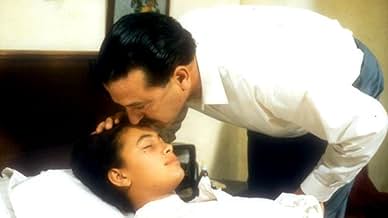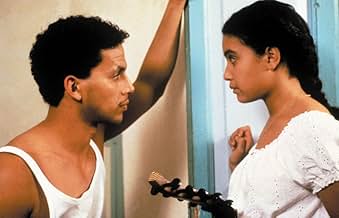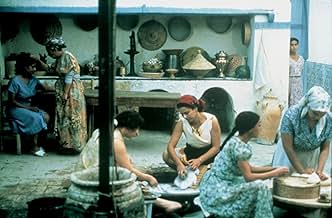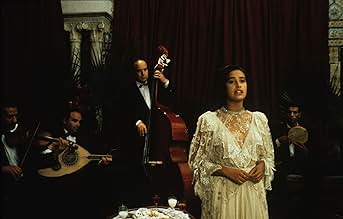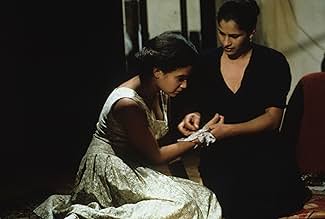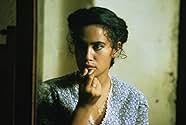IMDb RATING
7.3/10
1.2K
YOUR RATING
As she grows up, Alia (the daughter of housemaid Khedija) learns the secrets of the peaceful palace where she and her mother live.As she grows up, Alia (the daughter of housemaid Khedija) learns the secrets of the peaceful palace where she and her mother live.As she grows up, Alia (the daughter of housemaid Khedija) learns the secrets of the peaceful palace where she and her mother live.
- Awards
- 7 wins & 1 nomination total
Hind Sabri
- Alia
- (as Hend Sabri)
- …
Ghalya Lacroix
- Alia
- (as Ghalia Lacroix)
- …
Nejia Ouerghi
- Khalti Hadda
- (as Najia Ouerghi)
- Director
- Writers
- All cast & crew
- Production, box office & more at IMDbPro
Featured reviews
Set in 1950s Tunisia at the end of the French colonial rule, Moufida Tlatli's first directorial feature film encompasses a politically charged era through social dynamics, feminist vision and artistic choices, including - but not limited to - the first appearance of Hend Sabry, who went on to become one of the leading actresses of Tunisian and Arab cinema.
"The Silences of the Palace" tells the story of Alia, a nightclub singer visiting the bey's palace, where she grew up as the daughter of a servant. Upon her return, Alia embarks on reminiscing her adolescence and girlhood, uncovering the ghosts of her past and a murky family history.
"We were taught one rule in the palace: Silence", said one woman protagonist in the movie.
Clashes between Tunisian nationalist forces and the French forces are conveyed exclusively through radio reports, as we accompany the characters during curfews. Introducing well-developed female characters in a light and funny dialogue, the film also portrays their struggles in the monarch's palace and in the city at large. Ultimately, the "silence" here refers to the one covering sexual violence. However, the film offers hope subtly, in its enforcement of Arab women's voices in spaces where they were silenced.
This rebellious use of sound recalls the feminist movement's connection to music. The first wave of the feminist movement that occurred at the end of the 19th and early 20th centuries adapted soldier's songs for marches, borrowed tunes from popular songs and composed songs based on hymns, creating anthems about women suffrage. Whereas in the second wave (1960 - 1980), female bands created a specific genre within the punk rock genre, narrating the female experience and demands for justice.
Not only are the women of "The Silences of the Palace" singing labor songs in most of their scenes, but also the main character's voice defiantly sets the tone for the entire film. Through it, we are sent into a deep dive of musical heritage (put together by Anouar Brahem and Faouzi Thabet), whether Um Kalthoum's songs handpicked to feel like subtle messages to the beys, or the rebels' anthem that plays a key factor in the film's climax.
"The Silences of the Palace" could be defined as a coming-of-age story of a musician, whose act of singing was her coping mechanism under patriarchal and colonial rule; it was her tool of resistance, her means of communication with different social classes and her chaperone for more hopeful possibilities.
One cannot overlook the other cinematographic elements of the film. The cinematography and costume design offer general shots that act as art installations; we are told of entanglement through a scene of hands intertwining and told of mystery through a chase scene occurring in a traditional setting. The set designer's rich use of color and poignant classical details are visible in the halls, the bedrooms and the living rooms inhabited by the bey's family. Mirrors exhibit their duality, affairs and detachment. Lack of white in the space underlines the darkness behind luxury. Their materialism contrasts with the empty space occupied by the servants; an underground floor surrounded with white walls and fabric.
In remembrance of Moufida Tlatli, Hend Sabry wrote: ""Mova": the woman, the mother, the resonant voice, harboring a delicate emotion that tired her and made her create cinematic masterpieces at the same time... I miss you while you are alive, and I will miss a part of myself after your departure, and Arab cinema has missed one of its greats today."
"The Silences of the Palace" tells the story of Alia, a nightclub singer visiting the bey's palace, where she grew up as the daughter of a servant. Upon her return, Alia embarks on reminiscing her adolescence and girlhood, uncovering the ghosts of her past and a murky family history.
"We were taught one rule in the palace: Silence", said one woman protagonist in the movie.
Clashes between Tunisian nationalist forces and the French forces are conveyed exclusively through radio reports, as we accompany the characters during curfews. Introducing well-developed female characters in a light and funny dialogue, the film also portrays their struggles in the monarch's palace and in the city at large. Ultimately, the "silence" here refers to the one covering sexual violence. However, the film offers hope subtly, in its enforcement of Arab women's voices in spaces where they were silenced.
This rebellious use of sound recalls the feminist movement's connection to music. The first wave of the feminist movement that occurred at the end of the 19th and early 20th centuries adapted soldier's songs for marches, borrowed tunes from popular songs and composed songs based on hymns, creating anthems about women suffrage. Whereas in the second wave (1960 - 1980), female bands created a specific genre within the punk rock genre, narrating the female experience and demands for justice.
Not only are the women of "The Silences of the Palace" singing labor songs in most of their scenes, but also the main character's voice defiantly sets the tone for the entire film. Through it, we are sent into a deep dive of musical heritage (put together by Anouar Brahem and Faouzi Thabet), whether Um Kalthoum's songs handpicked to feel like subtle messages to the beys, or the rebels' anthem that plays a key factor in the film's climax.
"The Silences of the Palace" could be defined as a coming-of-age story of a musician, whose act of singing was her coping mechanism under patriarchal and colonial rule; it was her tool of resistance, her means of communication with different social classes and her chaperone for more hopeful possibilities.
One cannot overlook the other cinematographic elements of the film. The cinematography and costume design offer general shots that act as art installations; we are told of entanglement through a scene of hands intertwining and told of mystery through a chase scene occurring in a traditional setting. The set designer's rich use of color and poignant classical details are visible in the halls, the bedrooms and the living rooms inhabited by the bey's family. Mirrors exhibit their duality, affairs and detachment. Lack of white in the space underlines the darkness behind luxury. Their materialism contrasts with the empty space occupied by the servants; an underground floor surrounded with white walls and fabric.
In remembrance of Moufida Tlatli, Hend Sabry wrote: ""Mova": the woman, the mother, the resonant voice, harboring a delicate emotion that tired her and made her create cinematic masterpieces at the same time... I miss you while you are alive, and I will miss a part of myself after your departure, and Arab cinema has missed one of its greats today."
Assimilated into the Turkish Ottoman Empire in the 16th century, Tunisia became a French protectorate in 1881 until President Habib Bourguiba, leader of a two-year guerrilla war for independence, declared Tunisia a republic in 1957, ending the rule of the former Ottoman Beys. Winner of the Cannes Jury Prize in 1994, Tunisian director Moufid Tlatli's Silences of the Palace depicts the oppressive nature of the male-dominated palaces and the price that women servants had to pay. Required not only to cook and clean, but to serve the sexual needs of the princes, Silences shows the consequences in the lives of two strong-minded but vulnerable women: Khedija (Amel Hedhili) and her young daughter Alia (Hend Sabri).
The film opens in the 1960s. Alia (Ghalia Lacroix), is now 25 and performing as a night club singer. Though she is nominally free, she is beholden to a man who refuses to marry or have children. When she learns of the death of Prince Sidi Ali (Kamel Fazaa) she returns to the palace in which she grew up to pay a condolence call to Ali's near-blind widow (Najia Ouerghi), a visit that opens the floodgates of memories. Told in flashbacks, the film shows Alia as a pre-adolescent becoming increasingly aware of her own body and sadly, of her mother's true role in the palace. Alia is a gifted singer and the musical numbers in the film are hauntingly beautiful but nothing can hide the torment the young girl faces in trying to find out who her father is and to sort out where she belongs. The performance of Ms. Sabri is wondrous as she conveys the confusion of coming of age in a non-nurturing environment while still maintaining her charm and enchanting us with her songs.
Tlatli, in her first feature film, never shoots outside of the palace interior, conveying the sense of oppression and isolation though the servants listen on the radio to news about the growing struggle for independence. The women are strong and resilient, however, in spite of what they must face each day. Though Khedija tries to protect her daughter from the same fate she suffers, she knows that her power is limited. "If a man touches you, run away,'' she tells her, "Your place is with me in the kitchen." When Alia suggests that they both leave together, her mother can only respond "Where would we go? This is the only home I've ever known." While Tlatli bravely challenges the institutions that led to male dominance, there is a tone of resignation and acceptance in the silences that suggests the subservient role many women play in Moslem countries to this day. Silences of the Palace is a lovely film but one that left me with a sense of aching loss.
The film opens in the 1960s. Alia (Ghalia Lacroix), is now 25 and performing as a night club singer. Though she is nominally free, she is beholden to a man who refuses to marry or have children. When she learns of the death of Prince Sidi Ali (Kamel Fazaa) she returns to the palace in which she grew up to pay a condolence call to Ali's near-blind widow (Najia Ouerghi), a visit that opens the floodgates of memories. Told in flashbacks, the film shows Alia as a pre-adolescent becoming increasingly aware of her own body and sadly, of her mother's true role in the palace. Alia is a gifted singer and the musical numbers in the film are hauntingly beautiful but nothing can hide the torment the young girl faces in trying to find out who her father is and to sort out where she belongs. The performance of Ms. Sabri is wondrous as she conveys the confusion of coming of age in a non-nurturing environment while still maintaining her charm and enchanting us with her songs.
Tlatli, in her first feature film, never shoots outside of the palace interior, conveying the sense of oppression and isolation though the servants listen on the radio to news about the growing struggle for independence. The women are strong and resilient, however, in spite of what they must face each day. Though Khedija tries to protect her daughter from the same fate she suffers, she knows that her power is limited. "If a man touches you, run away,'' she tells her, "Your place is with me in the kitchen." When Alia suggests that they both leave together, her mother can only respond "Where would we go? This is the only home I've ever known." While Tlatli bravely challenges the institutions that led to male dominance, there is a tone of resignation and acceptance in the silences that suggests the subservient role many women play in Moslem countries to this day. Silences of the Palace is a lovely film but one that left me with a sense of aching loss.
Let us begin by discussing this film's title "The Silences of the Palace".This catchy title is an absolute misnomer as in real terms there are no silences in the palaces.Most of the palaces featured in the film are full of sounds but a feeling of silence is deliberately implied as there is no one willing to hear these sounds.Moufida Tlatli is an important name in the realm of both Arab as well as Tunisian cinema.She finished her cinema studies at famous French film institute IDHEC.Many famous Arab films bear her name as she did editing work for many prominent Arab film makers.Her debut film "The Silences of the Palace" is about the last days of Tunisian aristocracy.It was a time of confusion as Tunisian rulers were worried about their fate as the nation was looking forward to an imminent freedom.As portrayed in this film the plight of the common people including women has not changed as they are being continually forced to remain in silence.Moufida Tlatli dedicated this film to her mother who was a constant source of inspiration to her while she was drafting this film.If a list of best Arab films is drafted,this film by Moufida Tlatli will surely be there.
The best film ever made in the Arab World really isn't a superlative that would be difficult to attain, but this film is really a masterwork.
Aliya a singer with an superb voice but little success is invited to the palace where she spent her childhood as the daughter of a servant. She never really got to know who her father was, that she has been invited back to the palace after the head of the household, member of the Turkish ruling family of pre-independence Tunisia has died is no accident.
Back in the palace all her childhood memories come back to Alia. She remembers her mother being the concubine of the deceased. His wife was barren, and she becomes sure that she is his daughter.
She also remembers how her love for music helped her to gain prestige in the palace. But the songs she sang were not just entertainment. The melodies of Umm Kulthum were broadcasted by Radio Cairo to spread the message of Arab awakening and the longing for independence. Albeit its political aspects also the ruling family, a puppet on the strings of the French, enjoys the music. But for the masses the songs also become a symbol for the longing for freedom. falls in love with one student who is an independence activist. He is hiding in the palace where his aunt is another servant. He promises her a brilliant future but already at the beginning of the film we are told that the promise was not to be kept.
The film is a ingenious ridiculization of political rhetoric and seldom ever has Oriental music bee integrated in a film so brilliantly (except perhaps Ray's Jalsaghar). You will enjoy it even if Arab music doesn't mean anything to you.
Aliya a singer with an superb voice but little success is invited to the palace where she spent her childhood as the daughter of a servant. She never really got to know who her father was, that she has been invited back to the palace after the head of the household, member of the Turkish ruling family of pre-independence Tunisia has died is no accident.
Back in the palace all her childhood memories come back to Alia. She remembers her mother being the concubine of the deceased. His wife was barren, and she becomes sure that she is his daughter.
She also remembers how her love for music helped her to gain prestige in the palace. But the songs she sang were not just entertainment. The melodies of Umm Kulthum were broadcasted by Radio Cairo to spread the message of Arab awakening and the longing for independence. Albeit its political aspects also the ruling family, a puppet on the strings of the French, enjoys the music. But for the masses the songs also become a symbol for the longing for freedom. falls in love with one student who is an independence activist. He is hiding in the palace where his aunt is another servant. He promises her a brilliant future but already at the beginning of the film we are told that the promise was not to be kept.
The film is a ingenious ridiculization of political rhetoric and seldom ever has Oriental music bee integrated in a film so brilliantly (except perhaps Ray's Jalsaghar). You will enjoy it even if Arab music doesn't mean anything to you.
This film is a powerful story about economic and sexual oppression, and is equally interesting as a sort of history of underrepresented people during the French occupation as it is a comment on women's rights in Tunisia. I don't like what the commenter from Germany said- 'best film made in the Arab world wouldn't be a difficult superlative to obtain'? There are many great films that have been made in the Arab world, and whatever else you said about the film is worthless to me when you make that kind of statement because it tells me how many of the great Arab films you must have seen to judge it by- not many. I would agree, it is without doubt one of the best Arab films I've seen- but I would have to see literally thousands of Arab films before I could be comfortable making such an outrageous generalization.
Did you know
- ConnectionsFeatured in Women Make Film: A New Road Movie Through Cinema (2018)
- How long is The Silences of the Palace?Powered by Alexa
Details
- Release date
- Countries of origin
- Languages
- Also known as
- Sarayın Sessizliği
- Production companies
- See more company credits at IMDbPro
Contribute to this page
Suggest an edit or add missing content



